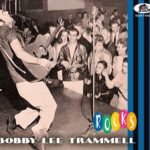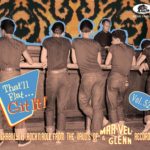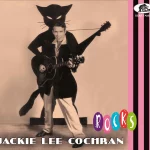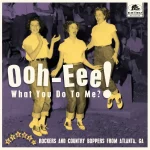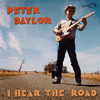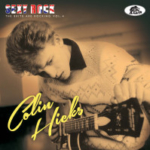Bobby Lee Trammell – Bobby Lee Rocks
Bear Family BCD17779
Arkansas Twist – It’s All Your Fault – Shirley Lee – I Sure Do Love You Baby – You Mostest Girl – Uh Oh – My Susie J. – My Susie Jane – Open Up Your Heart – Woe Is Me – Hi Ho Silve – Been A Walking – Come On Baby – Sally Twist (part I) – Carolyn – I Love ’em All – New Dance In France – If You Don’t Wanta, You Don’t Have To – Come On And Love Me – Tator – If You Ever Get It Once (You Gonna Want It Again) – I Need Love – Am I Satisfying You – Arkansas Stomp – You Make Me Feel So Fine – Shimmy Lou – Betty Jean – Toolie Frollie – Sally Twist (part II) – Mayonaise Man – Jenny Lee – Whole Lotta Shakin’ Goin’ On – You’re The Mostest Girl
Bobby Lee Trammell is primarily known to fans for his fantastic debut single, recorded in November 1957, the wild Shirley Lee coupled with I Sure Do Love You Baby, a mid-tempo rockabilly reminiscent of Elvis Presley. On these two tracks, Trammell is accompanied by James Kirkland on double bass and James Burton on guitar, both of whom played with Bob Luman before joining Ricky Nelson, who would later cover Shirley Lee on his second Imperial album.
With this single, Trammell’s place in the rock ‘n’ roll pantheon was assured, but fortunately for us, he continued to record in the decades that followed, covering a plethora of musical genres. This compilation traces this chaotic journey, focusing on the most rock-oriented tracks, from this first single until 1977, the date of his last session. It shows the wide range of styles that Trammell could write (all songs but two are from his pen) and play. Those sessions not only feature musicians, including Joe Maphis, Johnny and Dorsey Burnette, Travis Wammack, The Jordanaires and Sonny Burgess, but also engineers and producers like Scotty Moore, Sam Phillips, Russell Sims and an impressive list of record labels.
In 1958, he recorded “You Mostest Girl,” one of his best tracks, still in the Presley vein. The band has grown to include a vocal ensemble akin to the Jordanaires. The same session also produced a soft-Rockabilly marvel, the hiccupy Uh Oh. Listening to this track, you understand why Ricky Nelson had asked Trammell to write songs for him.
The following years saw him evolve towards a more classic, even more sober Rock’n’Roll. If some of these sides are rather average (Woe Is Me), the whole still benefits from the tenacious, sometimes improbable vocals of Bobby Lee Trammell. The sixties were also those of the Twist, and Trammell did not escape this trend by recording Arkansas Twist. Some will say that he did well because the song would be one of his most important hits. The Rock’n’Roll fan will instead focus on It’s All Your Fault, the B-side, a mid-tempo country with a hypnotic drive that is much more interesting. Obviously, the success of Arkansas Twist generated a whole series of copies trying to repeat the success, whether it was Come On or Sally Twist. Recorded the same year, 1962, Carolyn is an excellent dragging blues, and I Love Em All has more than one trait in common with Chuck Berry’s Johnny Be Goode. He then moved towards a genre close to Sam the Sham with New Dance In France, a weird Tex-Mex-sounding tune.
Trammel then used for a time the stage name of Bobby Lee Trammell, the first American Beatle, which, when listening to the songs recorded at that time, is surprising. Indeed, these are closer in their aggressiveness and their marked blues sound to the Rolling Stones than to the four boys from Liverpool, whether it is If You Don’t Wanna, You Don’t Have To, the excellent Come On & Love Me (with a superb harmonica), or You Make Me Feel So Fine.
If You Ever Get It Once (You Gonna Want It Again) is a country rocker in the style of Jerry Lee Lewis, while I Need Love is almost a carbon copy of What’d I Say by Ray Charles. Fortunately, we find all the singer’s exuberance on Am I Satisfying You.
Always quick to adapt (or copy, depending on your point of view) to the trends and hits of the moment, Trammell offers with the wild Toolie Frollie an excellent answer to the Trashmen’s Surfin’ Bird (with a hint of Wolly Bully thrown in for good measure).
The 70s don’t seem to have had a hold on him, as his new version of You Mostest Girl (renamed You’re The Mostest Girl) seems timeless and particularly fresh. The same goes for the excellent version of Whole Lotta Shakin’ Goin’ On.
A final session in 1977 yielded Jenny Lee, an updated version of Shirley Lee, which, while it adds nothing to her greatness, is nonetheless very enjoyable.
After one last live appearance in 1984, Trammell turned to politics.
This excellent compilation does justice to a singer who, despite having a good dose of bad luck (some he provoked), managed to build an interesting career.
Available here.
Fred “Virgil” Turgis
